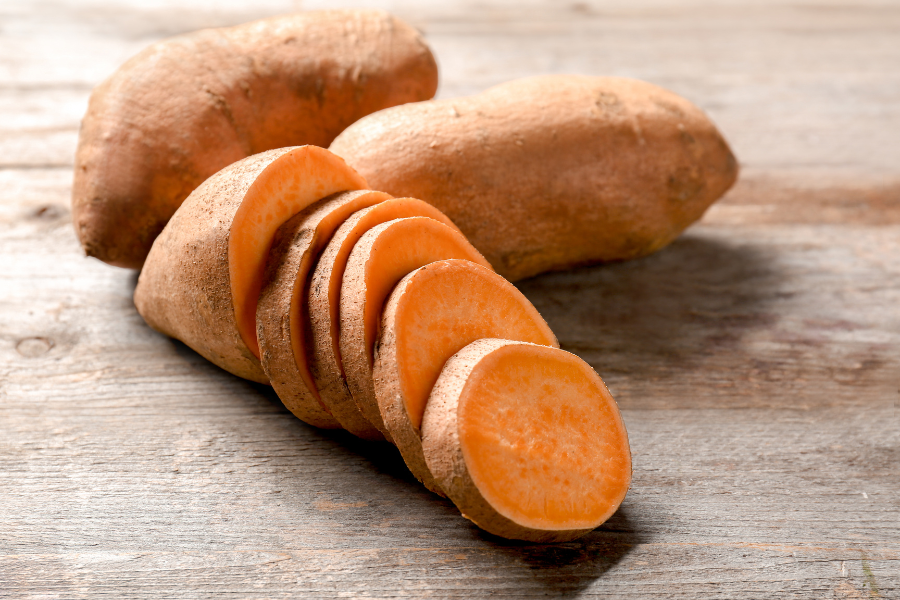You've probably laced your own meals with the gold of the earth, those sweet, succulent tubers that sweet potatoes are known to be. But what about your doggo? You might be wondering if you can slip him a slice of that orange yumminess too, whether raw or after rising to that consumable pinnacle by being cooked or baked. Is the sweet potato—raw as a radish or dressed to the nines—okay for our four-legged companions? Our answer is as clear as a bell—a resounding “no” to raw, but a tentative “yes” to cooked, all based on the latest mutt media. Gather round, canine and nutrition enthusiasts; we’re about to unravel a pet-friendly mystery.
Sweet Potato Basics
Before we unbox the safety label, it's crucial to understand what a sweet potato brings to the table. These tubers are a powerhouse of nutrition for humans, and in moderation, they can provide similar benefits for your pooch. Packed with fiber, vitamins A (in the form of beta-carotene), B6, and C, as well as minerals such as manganese and potassium, sweet potatoes offer a whole roster of wellness if included as part of a balanced canine diet. They’re also low in fat, and their naturally sweet taste makes them the apple of many a dog's eye.
The Raw Factor
Now, the catch. Raw sweet potatoes are chock-full of something your dog's system might not appreciate in such abundance—dietary fiber. High-fiber diets can lead to gassiness and a world of gastrointestinal unrest for your pet. But wait, there’s more. Raw sweet potatoes are also dense and can be a bit tough to chew, particularly for smaller breeds. Chunks of raw sweet potato can pose a choking hazard or, worse, a risk of causing an obstruction in your dog's digestive tract. This could be a visit to the vet that neither of you will relish. It's a no-go, folks. Raw sweet potatoes are a bit too raw for comfort.
The Cooking Conundrum
When sweet potatoes are cooked, the tough fibers soften, making it easier for your pup to gobble them up. Baking, steaming, or boiling can transform this tuber into a snack that your dog's digestive system is more likely to accept graciously. With a couple of caveats, of course. Firstly, moderation. A few bites here and there, maybe as a treat or a part of your pup's meals, are just fine. But large quantities of any new food can lead to a stomach ache, and too much sweet potato might mean too much of a good thing. And secondly, while a plain ol' sweet potato is a-okay, keep it free from butter, sugar, or spices that might be harmful to your dog.
How to Serve Sweet Potatoes Safely
You can serve sweet potatoes to your dog in a few safe ways:
- Mashed: A dollop in their bowl can make your pet's dinner a delight.
- Sliced: Cut into bite-sized pieces can be a quick treat.
- Dehydrated: If kitchen talents lean towards the arts and crafts, creating your own sweet potato dog chews by dehydrating thin slices can provide a culinary adventure for you and your fur child.
- In Snacks: Dog treat recipes often include sweet potatoes, ensuring the right quantities and preparations are followed for your dog's consumption.
Remember, sweet potatoes should be an occasional addition to your dog's diet, not the main act. Use them as supplements to a core meal plan designed around your dog's individual nutritional needs.
In Conclusion
Sweet potatoes offer a sweet deal when served in the right way and quantity. Cooked and served safely, they can be a delightful and nutritious addition to your pet's diet. But as far as the raw debate goes—err on the side of caution. It's just not worth the risk of dietary disruption or, in the worst-case scenario, a dangerous obstruction.
Understanding what foods are safe for your pet is part and parcel of responsible pet ownership. When in doubt, a conversation with your vet can offer tailored advice. Until then, keep those sweet potatoes safe and savory, and enjoy them in the best of both worlds, that of you and your beloved pet.



